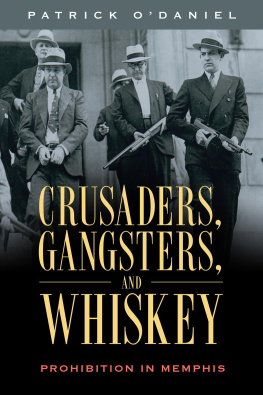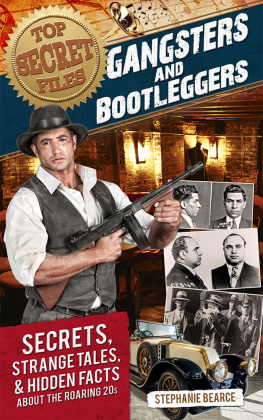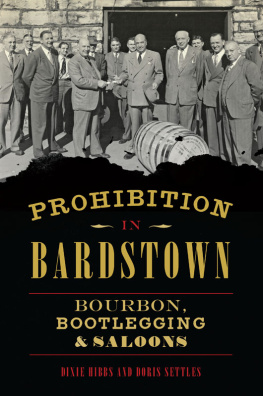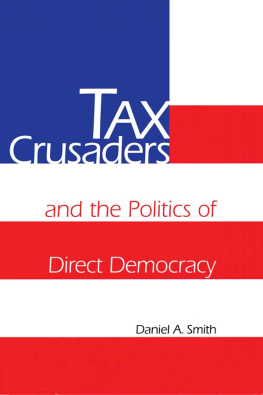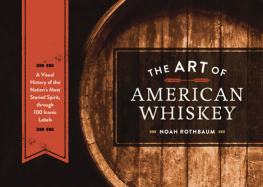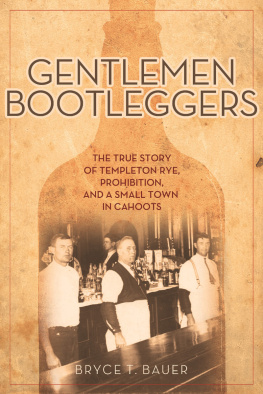CRUSADERS, GANGSTERS, AND WHISKEY
CRUSADERS,
GANGSTERS,

AND

WHISKEY
PROHIBITION IN MEMPHIS
Patrick ODaniel
University Press of Mississippi / Jackson
The University Press of Mississippi is the scholarly publishing agency of the Mississippi Institutions of Higher Learning: Alcorn State University, Delta State University, Jackson State University, Mississippi State University, Mississippi University for Women, Mississippi Valley State University, University of Mississippi, and University of Southern Mississippi.
www.upress.state.ms.us
Designed by Peter D. Halverson
The University Press of Mississippi is a member of the Association of University Presses.
Copyright 2018 by University Press of Mississippi
All rights reserved
Manufactured in the United States of America
First printing 2018
Library of Congress Cataloging-in-Publication Data
Names: ODaniel, Patrick. author.
Title: Crusaders, gangsters, and whiskey : prohibition in Memphis / Patrick ODaniel.
Description: Jackson : University Press of Mississippi, [2018] | Includes bibliographical references and index. |
Identifiers: LCCN 2018016621 (print) | LCCN 2018018647 (ebook) | ISBN 9781496820051 (epub single) | ISBN 9781496820068 (epub institutional) | ISBN 9781496820075 (pdf single) | ISBN 9781496820082 (pdf institutional) | ISBN 9781496820044 (hardcover : alk. paper)
Subjects: LCSH: ProhibitionTennesseeMemphis.
Classification: LCC HV5090.T2 (ebook) | LCC HV5090.T2 O43 2018 (print) | DDC 364.1/33209768109042dc23
LC record available at https://lccn.loc.gov/2018016621
British Library Cataloging-in-Publication Data available
FOR MY FATHER
CONTENTS
ACKNOWLEDGMENTS
I would like to thank the staff of the History Department and Memphis Room of the Memphis Public Library and Information Center, the Shelby County Archives, the University of Memphis Special Collections, and the Memphis Police Department Photo Lab for their assistance. I would like to thank Dr. Charles Crawford, G. Wayne Dowdy, Gina Cordell, Dr. James R. Johnson, Mark Greaney, Tom Colgan, Bill Dugger, Dr. Michael Bast, and Karen Campbell for their advice and encouragement. I would also like to thank my family, Uncle Frank, Sean, Rowan, Baba, Marcy, Ajna, Jeri, Mac, Kathy, and Kelly for their support.
ABBREVIATIONS
ASL | Anti-Saloon League |
CA | Commercial Appeal |
EA | Evening Appeal |
ES | Evening Scimitar |
NARA | National Archives and Records Administration |
NS | News Scimitar |
PS | Press-Scimitar |
WCTU | Womans Christian Temperance Union |
CRUSADERS, GANGSTERS, AND WHISKEY
City of Memphis and Shelby County, 1927. Courtesy of Memphis Room, Memphis Public Library and Information Center. A) Figure 3.1, B) Figure 14.1, C) Figure 15.1, and D) Figure 16.4
INTRODUCTION
No political, economic, or moral issue has so engrossed and divided all the people of America as the prohibition problem, except the issue of slavery.
Mabel Walker Willebrandt, US assistant attorney general
T he night air was hot, humid, and filled with the sound of cicadas. Deadly water moccasins lived in the woods by the creek, and anyone walking through them had to watch where he stepped. The lookouts hid in the trees and undergrowth and settled in for a long night. The men swatted away the swarms of bloodthirsty mosquitoes as they kept careful watch over the moonlit trails leading to the still. They stood ready to fire off warning shots from their rifles at the first sign of Prohibition agents, sheriffs deputies, or hijackers. They knew that if any raider made it past them undetected, their comrades could lose their freedom or their lives.
A short way up the trail, the moonshiners poured foul-smelling mash into a copper still. The mixture of water, cornmeal, sugar, and yeast had been fermenting in a buried vat for weeks. With the still full, they prepared a fire and stoked the flames until the boiling mash released its alcoholic vapor. The mist rose into the cap, moved through a copper line, and filtered through water in a barrel called the thumper. The fumes drifted through the worm, a coiled copper tube submerged in another water-filled barrel, where it cooled and liquefied. They discarded the toxic methanol-laced first drops, and filled bottles with the rest of the clear liquid as it dripped from the copper coil. It was the nights first batch of corn liquor, or as they liked to call it, white mule.
Some dismissed moonshining as just a gimmick to make easy money, but for bootleggers during Prohibition, it was a high-risk venture with a tremendous profit potential. Capitalism, like nature, abhors a vacuum. Prohibition took legal liquor away, but the desire for alcohol remained and bootleggers gladly stepped in and filled the demand.1
Statewide Prohibition took effect in Tennessee in 1909 after years of agitation by temperance organizations. Even after the National Prohibition Act ran its course from 1920 to 1933, Tennessees antiliquor laws remained in effect until 1939. Prohibitionists believed outlawing alcohol would make the country safer and more productive and improve the lives of women and children. They succeeded in the legislative arena, but in their navet, they did not understand that passage of a law did not guarantee its enforcement. Despite harsh penalties, bootlegging flourished and the country entered a period of unparalleled illegal drinking and lawbreaking. In the end, everything that could go wrong with Prohibition went wrong, and few places illustrate that failure better than Memphis.
Prohibition was one of the most important issues to affect Memphis after the American Civil War, and at the same time, it is one of the least understood in the citys history. Few events other than the civil rights movement had a more significant and longer-lasting impact. Even so, few written accounts were kept, and most oral histories were little more than conjecture.
The lack of adequate source material has led to shortcomings in the historiography of Prohibition in Memphis. Historians pulled information from the same small pool of stories and repeated them until readers no longer questioned their authenticity, accuracy, or thoroughness. Making this observation is not to say that any history of Memphis is flawed, but rather it is to say that previous accounts only provide a limited explanation of this critical period.
Bootlegging defined the failure of Prohibition in the 1920s and 1930s, and many historians maintained that bootlegging was an extension of Edward Hull Crumps political machine and functioned under its protection to support it financially. Sharon Wright wrote, Crump soon created a machine which sustained itself on corruption. During the age of Prohibition, his administration accepted bribes from brothel, gambling houses, and saloon owners.2 Roger Biles wrote, The necessary funds [for Crumps organization] materialized in the form of protection payoffs collected from gamblers, prostitutes, and liquor dealers operating in blatant violation of Tennessee prohibition statutes.3 Michael Honey wrote, [Crump] built his political machine by collecting money from illegal gambling dens, houses of prostitution, and, during Prohibition, from illegal liquor joints.4
 AND
AND 


